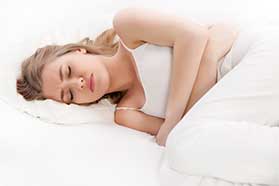Mold Poisoning & Toxicity Treatment in New Port Richey, FL

The environment in which we live is often riddled with toxins—from pesticides to polychlorinated biphenyls (PCBs) to heavy metals—which tax our bodies and overall immune systems as they work to eliminate these harmful substances. Mold, a toxin that can lurk in our own homes without being seen or smelled, can wreak havoc if not properly eliminated from both our indoor environment and our bodies.
Mold toxicity, a common form of a condition known as chronic inflammatory response syndrome , can ensue after a single exposure—or more commonly after prolonged exposure from a single source—to a building or home that has incurred water damage or just enough moisture to stimulate mold growth. However, mold can grow in any place with a lot of moisture including clothing, upholstery and paper products. Whatever the source of the mold, the contaminants that are present as the result of mold can have a catastrophic toxic impact on your body.
To schedule a consultation with a healthcare provider in New Port Richey that specializes in toxic mold treatment, call (727) 240-3424 or contact Dr. Lisa Maharajh online.
Toxic Mold Symptoms
Mold secretes toxic by products known as mycotoxins which cause the immune system to be in a constant fighting state. The inflammation that results from your hyperactive immune response can lead to chronic illness and a wide variety of potential symptoms, including allergic rhinitis, rashes, cognitive problems, neurological symptoms and a compromised immune system with marked inflammatory response. Other common toxic mold symptoms include:
- Fatigue and weakness
- Headache
- Memory issues and other cognitive issues like disorientation or difficulty concentrating
- Morning stiffness, joint and muscle pain
- Vertigo or feeling light-headed
- Skin-related issues like tingling, numbness or skin rashes
- Sensitivity to light
- Tremors
- Respiratory issues like a sudden chronic cough, shortness of breath, chronic sinusitis or asthma
- Changes in appetite
- Increased urinary frequency or increased thirst
- Vision-related issues like tearing, red eyes or blurred vision
- Digestive issues like abdominal pain, diarrhea or bloating
- Metallic taste in mouth
- Chronic inflammation
- Unusual complaints like sudden sharp pains
Mold Toxicity Diagnosis
If you have been exposed to a water-damaged building, or have experienced many of the above mentioned symptoms, you may be suffering from a toxic mold illness. It is important to seek medical care from a healthcare provider experienced in toxic mold treatment in order to experience relief. Your healthcare provider will conduct a thorough physical exam; he or she will likely have a mold toxicity checklist with questions that can help to identify whether or not you have been exposed to toxic mold. A blood, urine or saliva test may be recommended to identify the presence of toxins in your body.
Mold Toxicity Treatment
Removing the mold from your environment is the first step to regain control of your health. You must leave the moldy environment or invest in mold-removal efforts and avoid contact with all porous materials (like newspapers, clothing, wood, etc.) that were exposed to the moldy environment. It does no good to move into a mold-free building but then bring all the moldy objects from the old building with you, thus contaminating your new environment. It is also beneficial to avoid exposure to other environmental toxins such as pesticides and heavy metals during your mold toxicity treatment to improve your body's detoxification abilities and to stabilize the immune system.
For internal detoxification, your healthcare provider may recommend a detoxification program which utilizes clay, charcoal or other classic detoxification agents that bind to mycotoxins in order to remove them.
In addition, your healthcare provider will likely recommend a low mold diet which enhances your detoxification abilities.
| Foods to Exclude | Foods to Include |
|---|---|
| Sugar and sugary foods and beverages | Pasture-raised meats |
| Cheese | Wild-caught seafood |
| Alcoholic beverages | Vegetables |
| Bread | Healthy fats |
| Vinegar | Foods high in fiber |
| Mushrooms | Raw nuts and seeds, except for pistachios and peanuts |
| Processed foods, particularly meats | Filtered water |
| Fruit juices and dried fruits | Gluten-free grains like quinoa and brown rice |
| Corn | Unsweetened herbal tea |
Your healthcare provider may also recommend dietary supplements to aid in detoxification and to strengthen your immune health. These include:
- Glutamine
- Glycine
- Milk thistle
- Dandelion root
- Methyl folate and methylcobalamin (vitamin B12)
- Liposomal Glutathione
- Vitamin C
- Taurine
- N-acetyl cysteine
- Alpha lipoid acid
- Glycine
- Probiotics
Molds, fungus and bacteria may colonize in your sinuses, vagina, lungs, bladder and digestive tract, so treating yeast, fungal or bacterial infections is essential. Candida overgrowth is exceptionally common in people with mold toxicity. Anti-fungal herbs and medications may be recommended rather than traditional prescription medication like diflucan. Some healthcare practitioners may also advise the use of an infrared sauna.
A complete list of dietary guidelines, nutraceuticals and detoxification recommendations can be provided to you by your healthcare provider to address your current health state. If you are experiencing mold poisoning symptoms, don't delay treatment. Contact us today to get started. Call (727) 240-3424 or contact Dr. Lisa Maharajh online.
Maharajh Acupuncture & Herb Shoppe
Address
5805 Main StNew Port Richey, FL 34652
(727) 240-3424
www.maharajhacupuncture.com
Hours
Mon:
10:00 am - 5:00 pm
Tue:
10:00 am - 5:00 pm
Wed:
10:00 am - 5:00 pm
Thu:
10:00 am - 6:00 pm
Fri:
10:00 am - 3:00 pm
Sat:
Closed
Sun:
Closed


